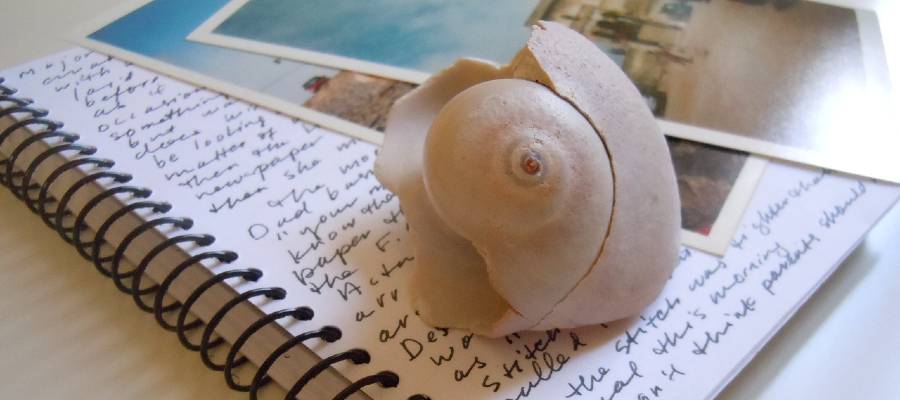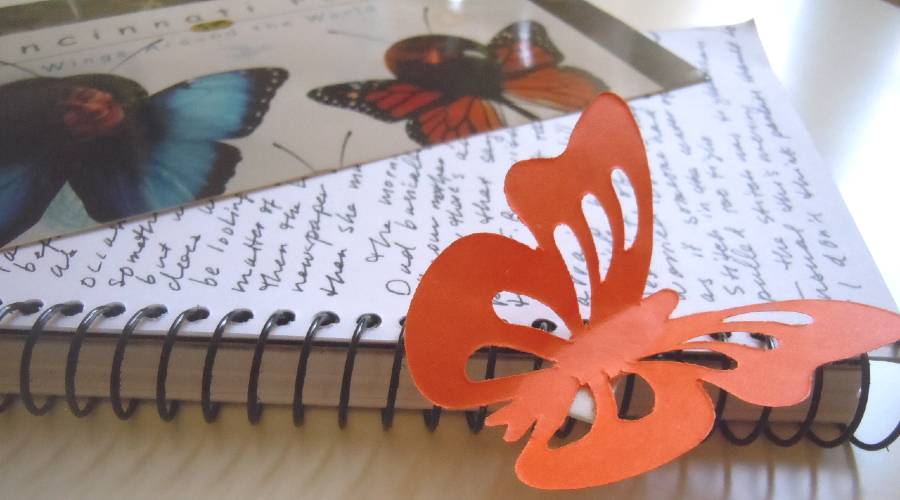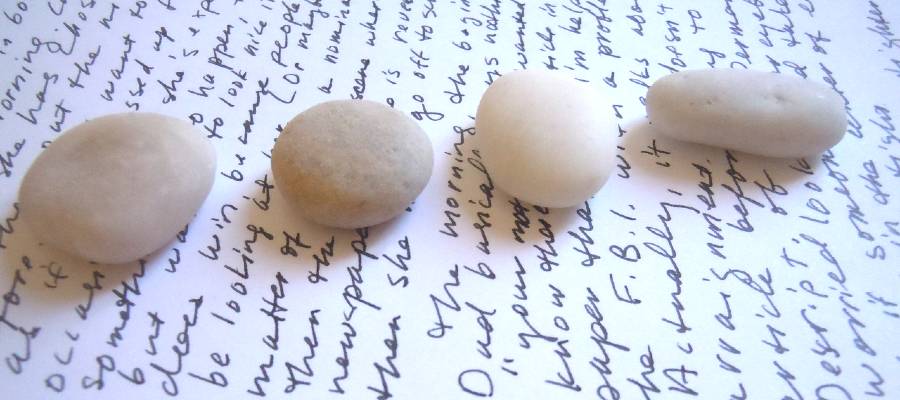Starting a Creative Writing Journal
On this page, you'll find ideas for keeping a creative writing journal, including different journal formats and activities. You can also browse our journaling prompts and get inspired by these writer's journal examples.
If you write fiction, drama, or poetry, a journal can build your writing muscles and generate ideas. It can be a laboratory, where you experiment with different approaches. It can be a source of details to add texture and crispness to your writing. And whenever you get stuck or feel uninspired, you'll be able to go to your creative writing journal for fresh material.
Journal format
To keep a journal, all you really need is something to write with, and something to write on. The specifics depend on your preferences and imagination.
You might find the ideas flow better when you write with a fountain pen, or a pencil like the ones you used in school, or when you type on a computer. You might feel inspired by a special notebook; you might enjoy the physical space of a large sketchpad, or you might better off with a small notepad you can carry in your pocket. Your journal might end up being a three-ring binder or a shoe box full of index cards. Try different options and see what works best for you.
Here are some factors to consider.
• Are you inspired by pretty notebooks?
Some people enjoy journaling more when the journal's pretty. For a while, those Moleskine notebooks were all the rage.
Personally, when someone gives me a pretty notebook, I feel like anything I write is just polluting it; I feel like a vandal if I so much as write my name. To me, pretty journals always look prettier when they are empty. Since this is such an easy effect to achieve, all of the blank books I've been given over the years have stayed blank. But there are many people who are not scared but inspired by those creamy pages, those elegant covers. You probably know which type of person you are.
• Bound or loose?
In a bound journal, the pages are preserved as you write them. With a loose-leaf journal, an index card journal, or any other type where the pages are not attached, you have more flexibility. You can remove parts of the journal to read them; you can rearrange or add pages as you like. On the other hand, there is the risk of the journal becoming disorganized and parts of it being lost. And for some journalers, keeping a permanent record is part of the point.
• Digital or longhand?
If you write on a computer, not only are you free to rearrange parts of your journal, you can also revise everything you write. This may actually be a disadvantage if you get caught up in editing instead of writing. You can lose the free flow of putting thoughts on paper, and you can also end up censoring yourself, editing your journal down to nothing. Writing on a computer, some people also miss the physical act of shaping the words with their hands. They feel the words in a different way when they are moving a pen or pencil over a page.

How often to journal?
Some writers journal every day, but that isn't a requirement. You can decide to journal at a specific time every day—for example, first thing in the morning or before you go to bed. Or, you can use journaling into a warm-up activity to focus your mind before you write fiction or poetry.
There's no one right approach. Your creative writing journal's just for you—it's impossible to get it wrong!
What to write about?
You can use your journal as a general record of your daily life. Or you might prefer to focus on a certain topic such as your garden or your reading or current events. You can write about your experiences, your thoughts, your memories. You can use it to collect material to use in fiction writing and poems. Some people keep notebooks next to their beds and write down their dreams.
There's no right or wrong way to keep a journal. The journal is for you, so you get to set the rules. Experiment, try different approaches, different kind of subject matter.
If you don't know what to write about, take a walk and make notes on what you observe around you: the buildings and people or the plants and birds, the weather, the look of the sky, the look of the ground (grass? wildflowers? pavement? dirt/pebbles? what color?), the sounds (cars? birds? wind? your own breath?), the smells (cut grass? car exhaust? sweat? wood smoke?), the shards and scraps that collect in the gutters. In every scene, there are an infinite number of details to notice if you pay close enough attention.
Another way to generate ideas: take a general theme -- let's say, Fear.
Then spend five minutes breaking that theme into subcategories; for example:
• Things that scare me
• Things I do when I'm afraid
• Techniques for overcoming fear, etc.
If you want, you can break some of those into even smaller categories. For example, "Things that scare me" could be subdivided further:
• Scary movies
• My nightmares
• Irrational fears and superstitions
• Fear of failure
• People I'm afraid of, etc.
Each item in your list is a topic that you can write about in your journal. With this system, in less than an hour, you can come up with enough writing topics for a whole year of journaling.
You can also use these journaling prompts.
Journal activities
Here are some more ideas for your creative writing journal:
1) People-watch.
The people around you can become fictional characters or the subjects of poems. You can give them roles in your writing, or just borrow details: your neighbor's nervous laugh, the shiny makeup that makes your mother's friend look like she's made out of plastic...
Make notes about people you know; take your creative writing journal to a coffee house or a hotel lobby and describe them: their appearance, their body language, their voices, the way they relate to each other. You can go beyond mere reporting and write what you imagine as well. What do you think that woman's name might be? Where do you think she lives? Is she having an affair with that man, or are they just business partners? What is she thinking right now? What is she hiding in that big purse? Any of this can be the beginning of a story or poem.
(Caution: if you are writing about people you know, be careful where you leave your creative writing journal. You may want to change names and identifying details to protect yourself against prying eyes.)
2) Listen.
Eavesdrop in restaurants, in stores. Listen to your own family and friends -- really listen. Not just to what they're saying, but to the words they use, the pauses, the unique rhythms of their speech. And write down pieces of speech when they are still fresh in your ears. If you wait too long, you'll find the sentences coming out in your own voice. Learning to capture different voices on paper will help you with dialogue for stories or scripts. It can also be a source for poetry.
3) Take a field trip.
Are you writing a scene in a police station? A city dump? Visit one. Write down the details that will make the setting come alive on the page.
On the other hand, if you're not in the middle of a writing project, taking a field trip can give you ideas for one. Go somewhere you would normally never go. By explaining you're a writer, you can get permission to visit places not normally open to the public. The basement of an aquarium? The backrooms of a funeral parlor? Take notes on your observations and see what story ideas emerge.
4) Use real-life stories.
The news, gossip, the experiences of your friends, and even stories from history books can be sources for creative writing. Make notes on the story, and imagine the parts you don't know. Imagine it as if you were there. What, exactly, did people see? What were they thinking? What did it all feel like? What led up to the event; what happened next? Let your imagination fill in the gaps. Or imagine that some part of it had been different. How does that change the story?
The children's book writer Linda Leopold Strauss used this method to write the novel novel Really, Truly, Everything's Fine. She saw a newspaper story about a man accused of a white-collar crime, and her imagination began to work. She started to wonder if the man had a family, what conversation they would be having over their breakfast table that morning when the newspaper story came out, how the man's child might react to the news of her father's crime, how this would change the life of his child. And so a novel was born.
5) Freewrite.
This technique is especially useful as a warm-up for creative writing or as a cure for writer's block.
The way freewriting works is that you keep your pen moving on the page, normally during a set amount of time (try setting a timer for five minutes, for example). If you don't have anything to say, you can write, "I don't have anything to say," over and over until something else occurs to you. Don't judge or correct yourself as you are writing; don't worry about sounding smart or even making sense. It is a way of tricking your mind into relaxing. Then interesting things often start to happen on the page.

6) Write to music. Play a piece of music that has no lyrics, and write in your journal about the lyrics you think would fit it best. This can be the beginning of a poem. Does the music stir up memories? If it were the soundtrack for a movie, what kind of movie would it be? Write part of the story.
7) Try different points of view. Italo Calvino wrote a short story in which his character, Marcovaldo, followed stray cats from through his city, seeing the alleys and rooftops from a cat's perspective. Experiment with describing the world around you from different points of view. How would your home look to a child, for example? Think about the details that would attract a child's attention that might not interest an adult. How about you -- how might a stranger describe you? What aspects of you might a stranger that your parents or spouse would overlook? In what ways would the stranger be wrong?
8) Collect words. Did you hear a word that you liked? An expression that caught your attention? In Spain, where I live, people say, "I was more lost than an octopus in a garage." That's quite a mental image.
Keep a list of interesting words that you can use as poem starters. You might do a little research on the origins of words and phrases in the list. Many words have curious stories behind them. How does the word sound to you? What images does it bring to mind? Does it have more than one meaning? How does it feel in your mouth? How is it different from similar words? What does it remind you of? Write about it.
9) Focus your attention. Spend a day concentrating on just one of your senses -- smell or sound. Or a day paying attention not to objects, but to their shadows and reflections. A day looking specifically at people's hands, the differences in their textures, their movements, the way they act. A day looking at the way people walk. Focusing your attention will lead to new discoveries.
10) Read actively. Reading can lead your mind in new directions. Of course, you don't want to copy anyone else's creative writing, but you can use it to get new ideas.
Maybe a novel you read makes you curious about a foreign culture, a historical event, a certain lifestyle. Do some research on this topic -- it could be the beginning of a story. Maybe a book gives you a fresh perspective on something in your own life or experience. Write about it. If you're a poet, you could try "writing between the lines" of a favorite poem. Write new lines for that poem, and then turn them into a poem of your own.

Creative writing journal - Next steps
Join our free email group for more creative writing tips.